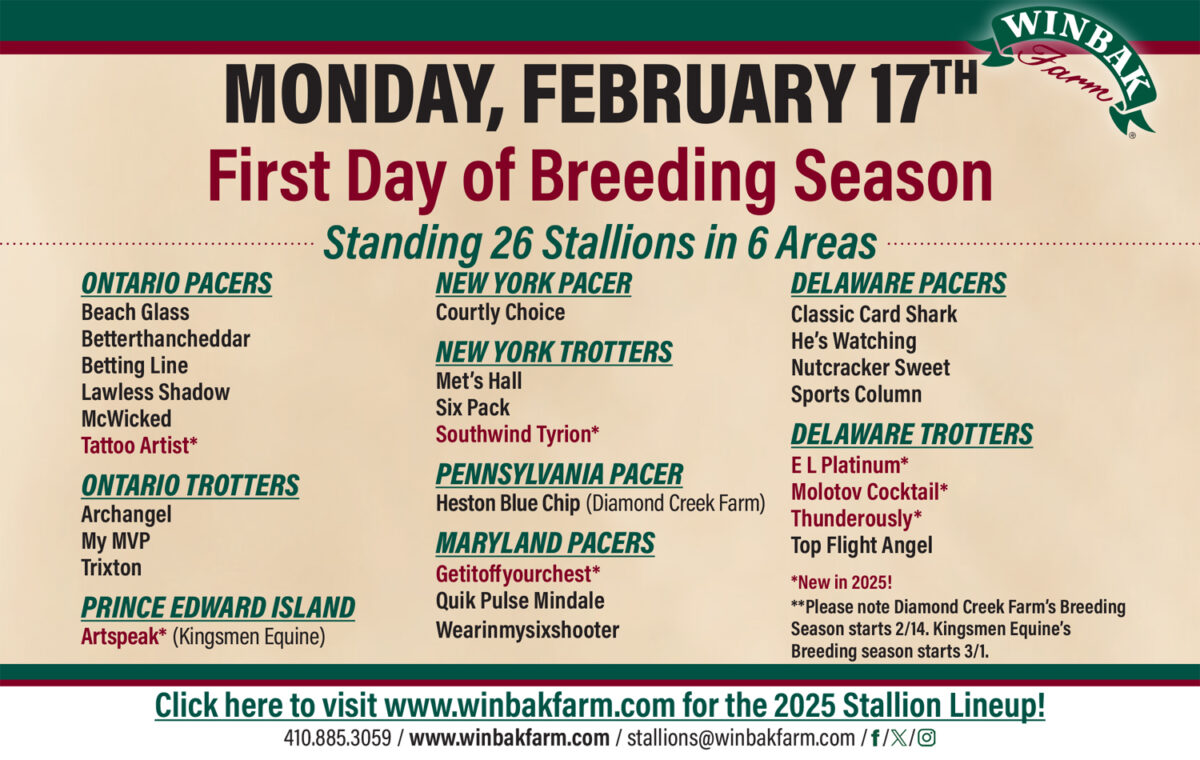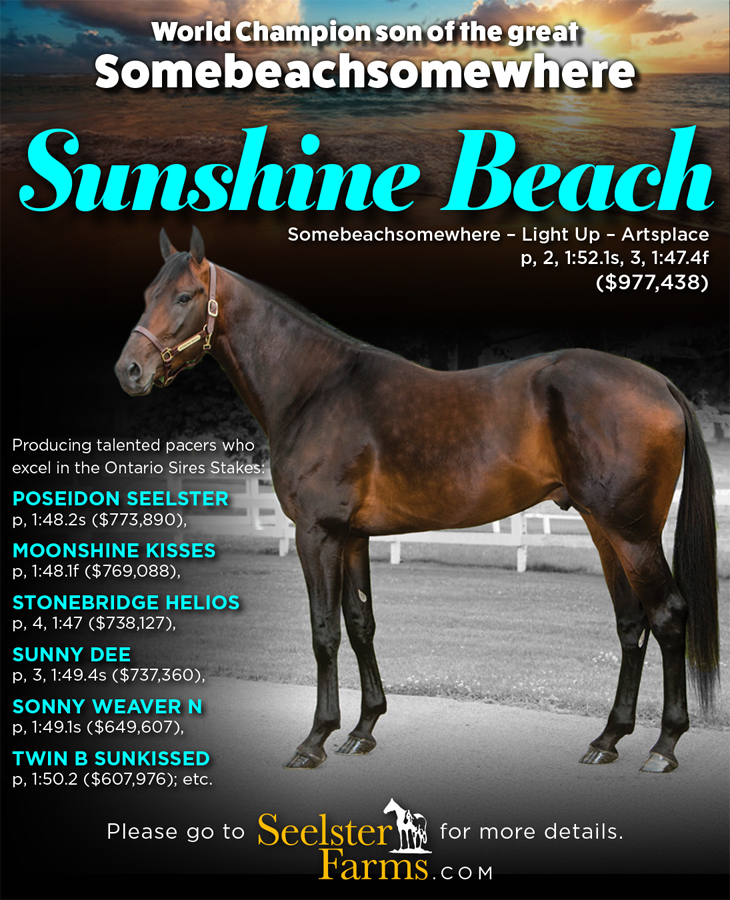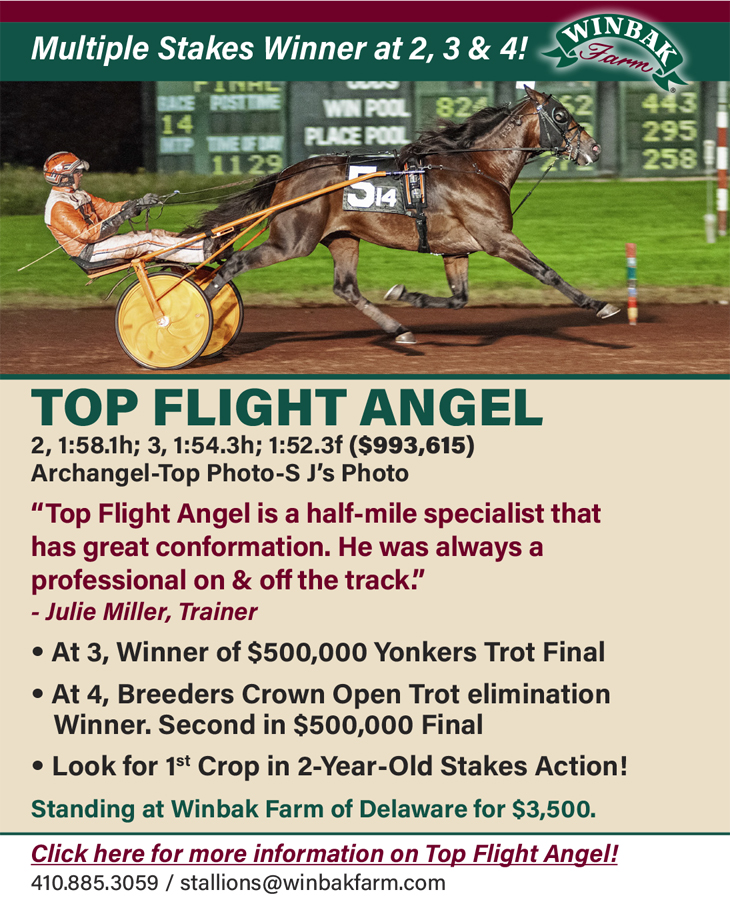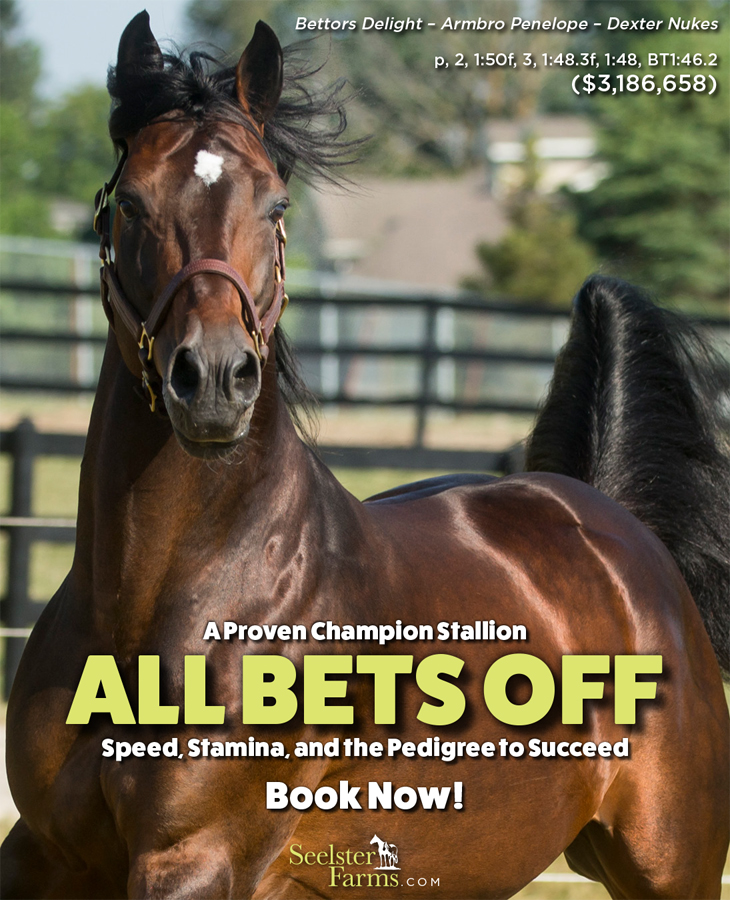
Paul Kelley on a life well lived
by Murray Brown
When speaking of Paul Kelley there is much to speak about.
Is it his renown as a horse trainer best known as the trainer and part owner of the greatest horse bred and raised in the great state of Maine, the world champion Obrigado ($1,923,834)?
Or we can speak of his great family led by their patriarch, his father Jack.
We can also address his role in the development of one of the world’s greatest thoroughbred horse trainers, Chad Brown.
It is perhaps best that we talk about all of these areas of a life well lived.
Obrigado was without doubt the best horse you ever had. How did he end up in your stable?
“Mike Andrew bred, raised and raced Obrigado at 2 and 3, with trainer Ivan Davies. I had previously bought a fairly decent horse named Uptempo by the same sire Boy Band [Lindy Lane] from Mike and done quite well with him.
“As was Mike’s practice, he generally sold his racehorses after their 3-year-old season. He called me and said that he thought Obrigado was a really good horse. He thought that he was probably better than Uptempo and that I should take a good look at him. Obrigado was in to sell at Harrisburg.
“Being a New Englander, I had followed the Maine Sires Stakes and knew that he had pretty much run the table in Maine. I and a couple of partners bought him at Harrisburg for $52,000. I guess the rest is history. I was blessed as anybody would be in being associated with a horse of his stature. The tougher the competition got, the better he got.
“I would be remiss if I didn’t speak of Mike Andrew. He was a great friend of the Kelley family and truly ‘a man for all seasons.’ He was a professor at the University of New Hampshire for 43 years. A graduate of both Cornell and Harvard. He was also very much a boots-on-the-ground type of guy. He loved all horses, but especially trotters. He bred them, raised them, bought them and raced them.
“He was also an accomplished polo player and a very good horseshoer. In addition to raising trotters, he was also an accomplished breeder of Hampshire sheep. If you were to ask Mike what he did, the response in his humble way would likely have been, ‘I’m a farmer.’”
Let’s speak of your family, specifically you dad Jack.
“My dad was first primarily known as a college hockey coach and then as a hockey executive. He started the hockey program at Colby College and then went on to Boston University where he won six Beanpots and back-to-back National Championships in ‘72 and ‘73. He then went on to be the first coach and general manager of the upstart New England Whalers of the World Hockey Association (WHA). That team won the first Avco Cup as champions of the WHA. He was inducted into the U.S. Hockey Hall of Fame in 1993 and eventually finished his career in hockey as President of the Pittsburgh Penguins from 1994-1997.
Your dad, together with your mom, Ginny, raised one heck of a family.
“Thank you for saying that. I was the oldest, followed by David, Nancy and Mark.
“I suppose that my destiny was with horses. Dad was coaching at Colby College in Maine and began dabbling around with Shetland ponies. The whole family worked with them and we eventually began racing them. When dad coached at B.U., we lived a short drive from Foxboro Raceway. I started following the horses there but never really dove into them until later, 1980, where I went to work for Jerry Mahoney at Bob and John King’s farm in Windsor, CT.
“I subsequently went to work with Warren Strout at Lewiston Raceway in Maine. Walter Case, Jr. was also working and driving all the horses in the barn. I then moved on to work with childhood friend Leo Bauer at Monticello. We went from there to Pompano Park and eventually Yonkers and Roosevelt when Ted Wing enlisted Leo to train and race part of Larry Kadish’s B string on the N.Y. circuit.
“I finally went on my own in 1986 racing primarily at Saratoga, racing mostly cheap claiming types and condition horses. During my time at Saratoga, I became involved with our then horseman’s association and was part of a long-protracted contract dispute [1993-94] that ultimately didn’t turn out favorably for the horsepeople. Nonetheless my time in Saratoga was outstanding and I loved being there. We still have our home and a small farm there just outside of town.
“The next in line was David. He is undoubtedly the most famous and probably the most accomplished of the group. He became the famous director, writer and producer David E. Kelley, an Emmy winner who was responsible for numerous TV hits and is considered among the most successful of all moguls in modern day television. On his way there, he played intercollegiate hockey at Princeton and also professionally in Europe. [Actually, all three of the male siblings played hockey in some form during their youth.]
“Then came our sister Nancy who we sadly lost in 2021. Other than me, she was the most horsey member of our family. She owned and bred horses on her small farm for the Maine stakes program with my dad. She was actually working on the track before me, despite me being three years older. But motherhood was more important to her and she got away from the racetrack to start and raise her family. She raised three great kids that have all gone on to great accomplishments in their lives. We miss her dearly.
“The youngest, Mark, is semi-retired from a long career in professional hockey. He was the head European scout for the Pittsburgh Penguins for maybe eight-10 years before taking on the job of head of amateur scouting for the Chicago Black Hawks in 2008. He subsequently got his name on three Stanley Cups in 2010, 2013 and 2015 with the Hawks.”
You are credited by some with being a factor in the success of Chad Brown, a man who is among the very most successful thoroughbred trainers in the world.
“I don’t know how much I had to do with Chad’s success. There is no doubt in my mind that he would have been just as successful with or without Paul Kelley involved in his career. But I sure am very proud of him. His accomplishments are amazing.
“The story of how Chad came to work with me is actually a funny one. My wife Joyce’s mother, Mary, lived in the small town of Mechanicville, not too far from Saratoga. She used to babysit her next-door neighbor’s kid. At some point, maybe when Chad was 12 or 13, she mentioned that the kid next door likes horses and wondered if I could give him a job. She told me that the kid was brilliant and consumed with horses. ‘Give the kid a job,’ she said. “I told her that I wasn’t running a day care. She yelled at me saying ‘He’s a good kid!’
“Fast forward to three years or so later. This same kid, now 17, shows up at the stable. ‘I’d like a job if possible’ he said. I knew he was Mary’s neighbor and that she’d probably kill me if I didn’t hire him.
He didn’t have a horse background, but he said that he wanted to learn. He basically said that he needed to start somewhere and very matter-of-factly said that his ultimate goal was to be in the thoroughbred business. Seventeen years old but clear in what his goal was. Every day he’d ask really well thought out questions. He just came to work looking to consume as much as he could every single day. He unknowingly challenged me to be a better horseman. I could never give him a bs or short answer, he was too smart for that. He was always a forward thinker and as quick a read as I’ve ever known.
“Within a very short period of time, he knew as much about harness racing as many who had spent a lifetime in the sport. He went to the yearling sales with me and learned pedigrees and conformation. He was just dialed in.
“I was fortunate enough to have him working with me for three and a half years. After he graduated from Cornell, he went to work for Hall of Fame trainer Shug McGaughey, then with noted veterinarian, Steve Allday [who started as an associate of Dr. Ken Seeber], then becoming the right-hand man of one of the greatest of all thoroughbred trainers, Bobby Frankel.
“He then went on his own establishing one of the greatest stables in the world on his way to winning five Eclipse Awards while still a relatively young man. Horses trained by Chad earned over $30 million last year!”
You are back training in Florida this year after spending a few years in New Jersey. What brought you back?
“Probably several reasons. Joyce and I have had a home here in Lake Worth for some time now, and she spends the winters here, even while I was training up north. We’ve been living apart for too long. I›m now ٧٠ years old. Life needs to be lived and enjoyed. Even though I like to say that I look at age as only being a number and I feel great, cold weather isn›t something that I want to endure anymore. I think that good weather and outdoor living is nice way to live. We have two boys, Mark, 33, and Sam, 31. Mark is working in L.A. for my brother’s DEK Productions and Sam just completed six years as assistant video coach and is now working with an eye surgery practice in Saratoga. Joyce gets credit [as all broodmares should] for raising two great boys.”
How is your stable now made up?
“We have 12 in training; five 2-year-olds, five 3-year-olds and two older racehorses. We’re primarily focusing on the New York and Massachusetts sire stakes programs. I have a great group of clients, along with the added plus of having my friend and triple Hall of Famer Wally Hennessey riding with me every day. That’s a real treat. Every day is a pleasure.
“I’ll bet that there are not too many horse trainers who can boast of ‘help’ like that in their stable. Wally has been a great friend for over 40 years. I’m privileged to have as great a horseman as him working with me before we both go up to compete in the racing wars next spring and summer.”













